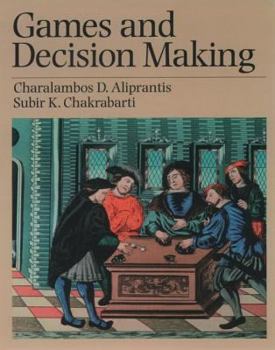Solutions Manual for Games and Decision Making
The authors are both mathematical economists; one teaches in an economics department and the other in a business school The latter is also editor of a prestigious economics journal and the author of 12 books in pure and applied mathematics. Because of their prestige as scholars and teachers, the National Science Foundation awarded them a grant to develop an interdisciplinary course, combining decision theory and game theory, for primary use in business and economics departments. The heart of business, and much of economics, is decision making. This book is a fully self-contained treatment of almost everything that can be called decision theory, from classical optimization, often covered in courses in mathematical economics and management science, to modern game theory, the cornerstone of modern managerial (micro) economics which provides the foundation for management strategy and competitive analysis. Only a knowledge of simple calculus and probability is required. Although some coverage in later chapters requires extra mathematical knowledge, that knowledge is developed as an integral part of the text. This book will be a key text for all professors who want to take a serious look at a decision theory, whether they are teaching undergraduate game theory or undergraduate or MBA courses in optimization and game theory. With careful selection of topics not to intimidate students, the authors show the integration of decision and game theory, as part of the same body of knowledge and demonstrates that unity. They move from the problem of the decision-maker, to progressively more complex decision problems, such as sequential rationality, culminating in topics of great immediate interest, auctions and bargaining. By building chapters squarely on what goes before, the authors avoid any unnecessary confusion in presenting a technical subject such as game theory, where ideas are often carelessly and callously presented out of proper sequence. The first chapter introduces optimization theory with a single decision-maker, by using problems from finance and business, to demonstrate how to find solutions to optimization problems. Building on concepts of the single decision-maker in the first chapter, Chapter 2 introduces fundamentals of modern game theory by developing the theory of strategic form games and their solutions, e.g. markets, voting auctions. Chapters 4 and 5 on sequential games builds on the foundation of Chapter 3 devoted to sequential decision-making. The concluding chapters (6&7) cover auctions and bargaining using what has preceded in Chapters 1-5. While the book is sound enough mathematically to be used in introductory mathematics courses on game theory, its broadest appeal will be in courses that show applications of decision theory in economics and business (perhaps even some political science courses at the graduate level). It has been successfully class tested in a management science course at the Krannert School of Management. The book shows the increasing importance of sound mathematical knowledge in decision-making for sustained competitive advantage.
Format:Paperback
Language:English
ISBN:0195133692
ISBN13:9780195133691
Release Date:July 1999
Publisher:Oxford University Press, USA
Length:224 Pages
Weight:0.95 lbs.
Customer Reviews
0 rating





